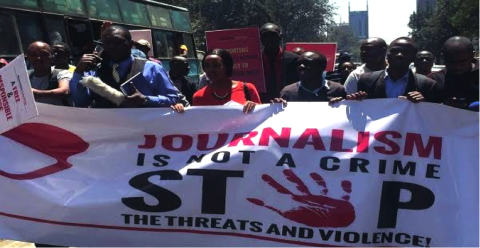How Kenya’s Restrictive Laws Limit Media Freedom
Submitted by fkakooza on

The Freedom in the World Report 2023 ranks Kenya as “a partly free society," with an aggregated score for guaranteeing political rights and civil liberties at 52 percent – just above average.
The annual report by Freedom House tracks progress on political rights and civil liberties in countries around the world. Kenya’s score for 2023 is an improvement from the previous year’s performance, at 48 percent. This notwithstanding, the media environment has all the signs of being gagged by the law and political intimidation.
A study by Dr. Othieno Nyanjom on political media ownership in Kenya, conducted in November 2012, found that the country’s laws threaten press freedom. Nyanjom’s report, titled ‘Factually True, Legally Untrue’, says some laws were formulated to suppress the truth from reaching the people and to cover the wrongs of public officials. “The plethora of laws affecting the Kenyan media are controversial, retrogressive, punitive and repressive,” it states.
Some of the laws that restrict media freedom in Kenya include the 2020 Computer Misuse and Cybercrimes Act. This law has provisions that criminalize the publication of false information and has been used to target journalists and social media users who are critical of the government. Observers say this law is overly broad and vague, and has a chilling effect on free speech.
For instance, in 2017, Walter Menya, a journalist with the Daily Nation, was charged with attempted extortion and publishing false information after he wrote a story about alleged corruption in the Kenyan Senate. Critics argued that the charges were politically motivated and aimed at intimidating the media.
Other laws that are suppressive to press freedom in Kenya include the 2013 Media Act, which gives the government power to appoint members of the Media Council of Kenya – something perceived as compromising the independence of the media regulator. Another law that hampers media freedom is the 2016 Security Law (Amendment) Act, which introduced provisions that criminalize the publication of images of security operations, with journalists facing the risk of imprisonment for up to three years for violating the law. This is seen as a blow to media freedom, as it limits the ability of journalists to report on security matters.
Other dangerous laws to the media include the Kenya Information and Communication (Amendment) Act of 2013, which gives the government power to regulate the media and restrict the publication of certain types of content; the Media Council Act of 2013; the Public Order Act; and the Official Secrets Act. All these are used to harass journalists and media houses that are considered too critical in their reporting.
In 2019, the government briefly shut down Standard Group, which owns The Standard newspaper and KTN television, after it aired a story about alleged corruption in the presidency. The government accused Standard Group of violating broadcasting regulations, but critics argued that the move was aimed at silencing critical reporting.
Some media laws meant to protect freedom of the press and access to information are not even applicable in reality. It is difficult to access some information despite having a law in place that grants public access to information.
"Some countries like Kenya have laws like the Access to Information Act, yet it is problematic to access some information even when you follow the protocols as guided by the law," says John Allan Namu, an award winning investigative journalist and chief execuvtive officer of the independent investigative media house, Africa Uncensored.
The restrictive laws are mostly applied during the election period, and some journalists have been victims of the oppressive legal system. Subsequently, some journalists and media houses resort to self-censorship in a bid to remain ‘safe’ from threats, intimidation or worse.
"Kenya press freedom is being gagged by oppressive government, determined to silence dissent," Denis Galava wrote in an article published by The Guardian in 2016. Galava, a former managing editor at The Daily Nation, was fired for writing a critical editorial in 2015 on how former President Uhuru Kenyatta had handled the media as the 2017 general elections approached.
Speaking at a panel on Media laws and Health during the Kenya Medical Association’s 48th Annual Conference held at Kamel Park Hotel, Kisii county in April 2021, David Omwoyo, CEO of the Media Council of Kenya, acknowledged that some journalists and media houses face harassment and intimidation by the law as they execute their duties. As one way of preventing clashes between press freedom and the law, the Media Council of Kenya has over the years embarked on training journalists in conflict reporting.
“This is to ensure that the media does not go out with headlines that incite Kenyans, while at the same time ensuring that Kenyans have access to the truth," Omwoyo said, adding that balancing of the two ideals is a delicate task.
- 2083 reads
